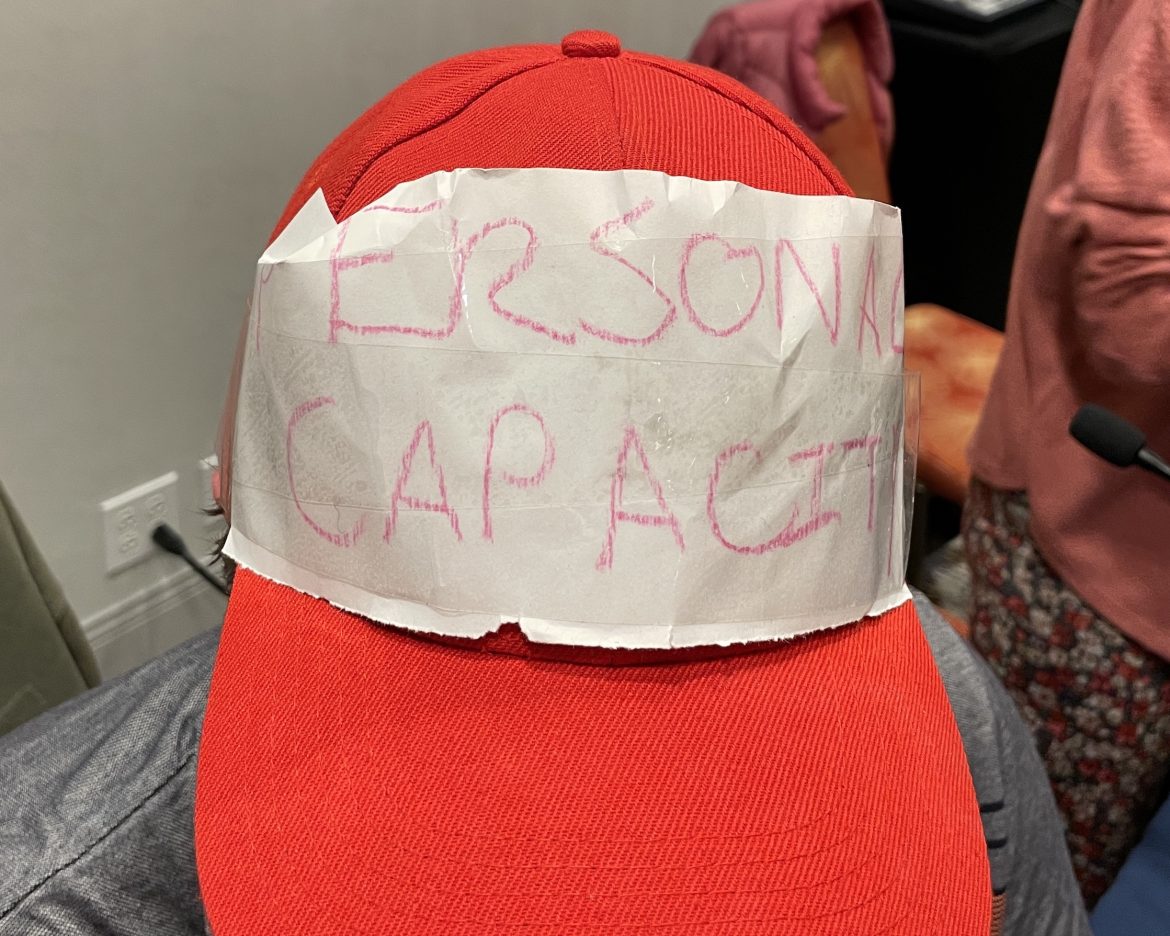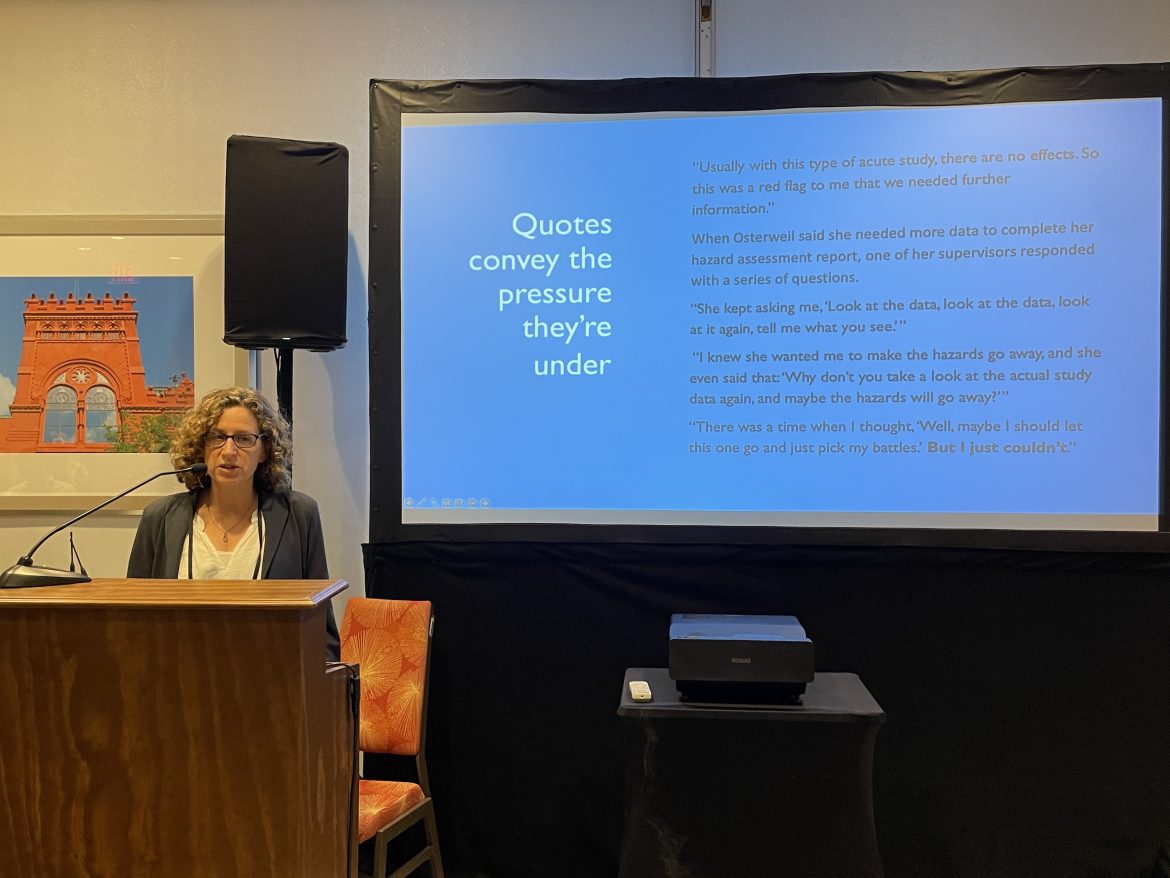
A whistleblower speaking at a recent Society of Environmental Journalists conference wore a hat that said “personal capacity” to make sure those in the room would not link his/her statements to any agency and that he/she would remain anonymous.
By Anna Barnes
Editor’s note: This is one in a series of stories coming out of a recent meeting of the Society of Environmental Journalists in Philadelphia.
What do you do when an employee comes forward, exposing their company for wrongdoing?
Environmental journalists discussed how to handle that situation at a recent Society of Environmental Journalist Conference in Philadelphia.
Sharon Lerner, a reporter for ProPublica, used a whistleblower to expose the Environmental Protection Agency for corrupt work practices and safety problems when assessing chemicals.
They had to figure out how to tell the story without endangering the careers of her sources, said Lerner, who led a panel on working with whistleblowers.
“If during this process, someone said to me, I can’t do this, I want to take it all back, I would have been okay with that,” Lerner said. “In other stories, I would not be okay with that but because there was so much personally at stake, I felt like it was a different situation. That goes for individual quotes, that goes for naming names.”

Quotes can convey the kind of pressure whistleblowers are under, said Sharon Lerner, a reporter for ProPublica. She also recommends using public access laws to obtain information to reduce pressure on the whistleblower.
Public Employees for Environmental Responsibility can help whistleblowers, said Kyla Bennet, who is a director with that organization. As a previous whistleblower herself, she understands the importance of protection against employers, she said.
“When you become a whistleblower, you become a pariah,” Bennett said. “So when they came to us with these stunning examples of what I think is malfeasance and corruption in the agency that has a very profound effect on human health and the environment, we tried to figure out, first of all, how to protect them and get the underlying environmental message out so we could try to get it fixed.”
Bennett said she and the whistleblower filed complaints with the Office of Inspector General. This is only one path whistleblowers can take, but all panelists agreed that whistleblowers need the guidance, support and protection of groups like Public Employees for Environmental Responsibility before going to a journalist.
“In the beginning, it can be life changing, they can not only lose their job, we have had clients who have lost their lives.” Bennett said.
Another necessity that might be overlooked in the process sounds counterintuitive, Lerner said. Somebody in the whistleblower’s chain of command needs to be aware of who they are in order to protect them.
If we didn’t inform somebody at the agency that the whistleblower provided information and it was going into an article and an Inspector General complaint and they figured it out and fired those employees, we couldn’t prove that it was retaliation, Bennett said. “They would say, we didn’t know what was happening. We had no idea who it was, how are we supposed to know?”
Retaliation against a whistleblower is illegal and that defense is one of the only legal protections available, she said.
To solve this problem, they gave a confidential copy of the Inspector General complaint to somebody low in the chain of command at the Environmental Protection Agency.
Remaining sensitive to the information and continuously asking for consent is another part of working with whistleblowers.
“Don’t pressure them to use their name and come out on the record,” Bennett said. “Say, if I file this (Freedom of Information Act request) or if I ask these questions, will it point to you?”
When filing a Freedom of Information Act request , the panelists recommend asking for broad information that will include the narrow piece of evidence you seek. That way it won’t point to a certain employee or a certain topic that can put either the whistleblower or the project at risk.
A whistleblower on the panel who would not identify himself/herself publicly said that another important question is whether the information is sensitive or protected. In the case that it is, get a lawyer involved. Not only do lawyers have certain confidentiality agreements to follow, but they can avoid civil and criminal penalties from the agency whose information may be leaked purposefully or not.
The agencies that can help whistleblowers with support and protection include Public Employees for Environmental Responsibility, the Government Accountability Project and the Project on Government Oversight, Bennett said.